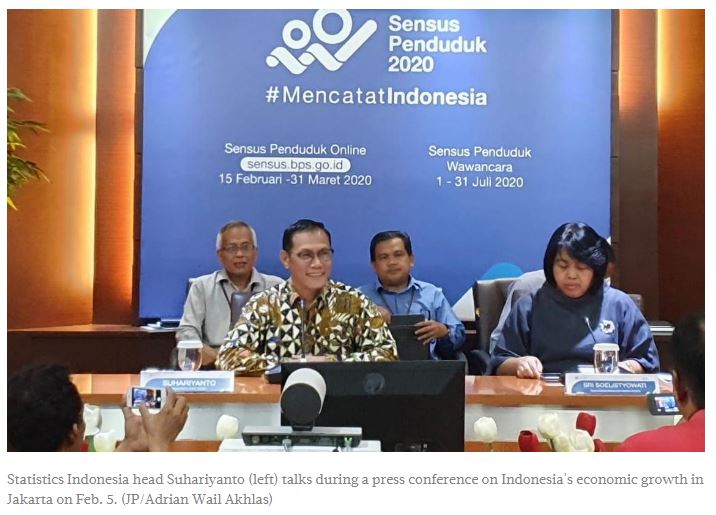Indonesia’s GDP growth stagnated at 5.02 percent last year, weakest since 2015
Indonesia’s economy grew 5.02 percent annually in 2019 because of weakening investments and exports, Statistics Indonesia (BPS) announced on Wednesday.
Last year’s gross domestic product (GDP) growth was the weakest since 2015, slowing from 5.17 percent in 2018. This also means the government failed to achieve the targeted growth of 5.3 percent stated in the 2019 state budget.
Meanwhile, the country’s economic expansion in the fourth quarter slowed to 4.97 percent year-on-year (yoy), the slowest since 2016’s fourth quarter, and contracted 1.74 percent quarter-to-quarter.
“It was not easy to stay at the 5-percent level but the growth is still good enough amid the global economic slowdown,” BPS head Suhariyanto told reporters during a press briefing in Jakarta.
The Jakarta Composite Index (JCI), the Indonesia Stock Exchange’s (IDX) main gauge, trimmed its gain after the BPS announcement to 0.4 percent from 0.6 percent.
The economy was buffeted last year by the United States-China trade dispute that caused a cooling global economy, he added, but the country’s growth was buoyed by relatively strong household spending throughout 2019.
Household spending, which accounts for more than half of GDP, grew by 5.04 percent last year, stagnant compared to the 5.05 percent in the previous year because of lowering vehicle sales.
Investment – the second largest contributor to GDP growth – expanded 4.45 percent last year, a far cry from the 6.67-percent growth recorded in 2018.
Government spending grew 3.25 percent from 4.8 in 2018, while exports and imports contracted 0.87 percent and 7.69 percent, respectively, last year.
Bank Mandiri chief economist Andry Asmoro wrote in a research note that the fourth quarter growth would be supported by “household consumption due to the seasonal factor of the year-end holiday”.
“Going forward, GDP growth could strengthen to 5.14 percent in 2020 supported by higher investment growth due to a diminishing political year effect and an accommodative monetary policy, as well as strong household spending,” he added.
The International Monetary Fund estimated in October that Indonesia’s GDP expanded just 5 percent last year before slightly strengthening to 5.1 percent this year, lower than the government’s target of 5.3 percent.
Source: https://www.thejakartapost.com/news/2020/02/05/indonesias-gdp-stagnated-at-5-02-percent-last-year-weakest-since-2015.html


 English
English




